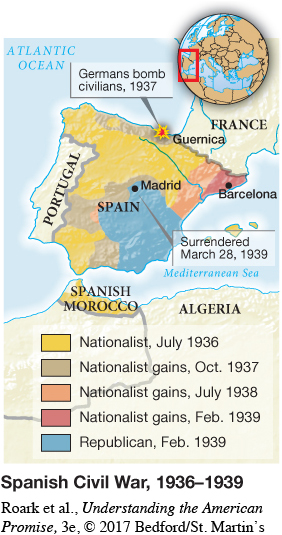The Price of Noninvolvement
In Europe, fascist governments in Italy and Germany threatened military aggression. Britain and France made only verbal protests. Emboldened, Hitler plotted to avenge defeat in World War I by recapturing territories with German inhabitants, all the while accusing Jews of polluting the purity of the Aryan master race. The virulent anti-Semitism of Hitler and his Nazi Party unified non-Jewish Germans and attracted sympathizers among many other Europeans, even in France and Britain.
In Japan, a stridently militaristic government planned to follow the invasion of Manchuria in 1931 with conquests extending throughout Southeast Asia. The Manchurian invasion bogged down in a long and vicious war when Chinese Nationalists rallied around their leader, Jiang Jieshi (Chiang Kai-shek), to fight against the Japanese. Preparations for new Japanese conquests continued, however. In 1936, Japan openly violated naval limitation treaties and began to build a battle-ready fleet to seek naval superiority in the Pacific.
In the United States, the hostilities in Asia and Europe reinforced isolationist sentiments. Popular disillusionment with the failure of Woodrow Wilson’s idealistic goals caused many Americans to question the nation’s participation in World War I. In 1933, Gerald Nye, a Republican from North Dakota, chaired a Senate committee that concluded that greedy “merchants of death”—American weapons makers, bankers, and financiers—dragged the nation into the war to line their own pockets. International tensions and the Nye committee report prompted Congress to pass a series of neutrality acts between 1935 and 1937 designed to avoid entanglement in foreign wars. The neutrality acts prohibited making loans and selling arms to nations at war.
By 1937, the growing conflicts overseas caused some Americans to call for a total embargo on all trade with warring countries. The Neutrality Act of 1937 attempted to reconcile the nation’s desire for both peace and foreign trade with a “cash-and-carry” policy that required warring nations to pay cash for nonmilitary goods and to transport them in their own ships. This policy benefited the nation’s economy, but it also helped foreign aggressors by supplying them with goods and thereby undermining peace.
The desire for peace in France, Britain, and the United States led Germany, Italy, and Japan to launch offensives on the assumption that the Western democracies lacked the will to oppose them. In March 1936, Nazi troops marched into the industry-rich Rhineland on Germany’s western border, in blatant violation of the Treaty of Versailles. One month later, Italian armies completed their conquest of Ethiopia, projecting fascist power into Africa. In December 1937, Japanese invaders captured Nanjing (Nanking) and celebrated their triumph in the “Rape of Nanking,” a deadly rampage that killed 200,000 Chinese civilians.

In Spain, a bitter civil war broke out in July 1936 when the Nationalists—fascist rebels led by General Francisco Franco—attacked the democratically elected Republican government. Both Germany and Italy reinforced Franco, while the Soviet Union provided much less aid to the Republican Loyalists. The Spanish civil war did not cause European democracies or the U.S. government to help the Loyalists, but more than 3,000 individual Americans enlisted in the Russian-sponsored Abraham Lincoln Brigade to fight alongside the Republicans. Abandoned by the Western nations, the Republican Loyalists were defeated in 1939, and Franco built a fascist bulwarkin Spain.[[LP Spot Map: SM25.01 Spanish Civil War, 1936–1939/
> CONSIDER CAUSE
AND EFFECT
What factors motivated aggression and expansionist efforts by Germany, Japan, and Italy in the 1940s?
> UNDERSTAND
POINTS OF VIEW
Why did so many Americans advocate isolationism or neutrality in the face of fascist aggression in Europe and Asia?
Hostilities in Europe, Africa, and Asia alarmed Roosevelt and some Americans. The president sought to persuade most Americans to moderate their isolationism and find a way to support the victims of fascist aggression. He warned that an “epidemic of world lawlessness is spreading” and pointed out that “mere isolation or neutrality” offered no remedy. The popularity of isolationist sentiment caused Roosevelt to remark, “It’s a terrible thing to look over your shoulder when you are trying to lead and find no one there.” Roosevelt understood that he needed to maneuver carefully if the United States were to help prevent fascist aggressors from conquering Europe and Asia, leaving the United States an isolated island of democracy.
> QUICK REVIEW
Why did isolationism during the 1930s concern Roosevelt?
Understanding the American Promise 3ePrinted Page 710
Section Chronology